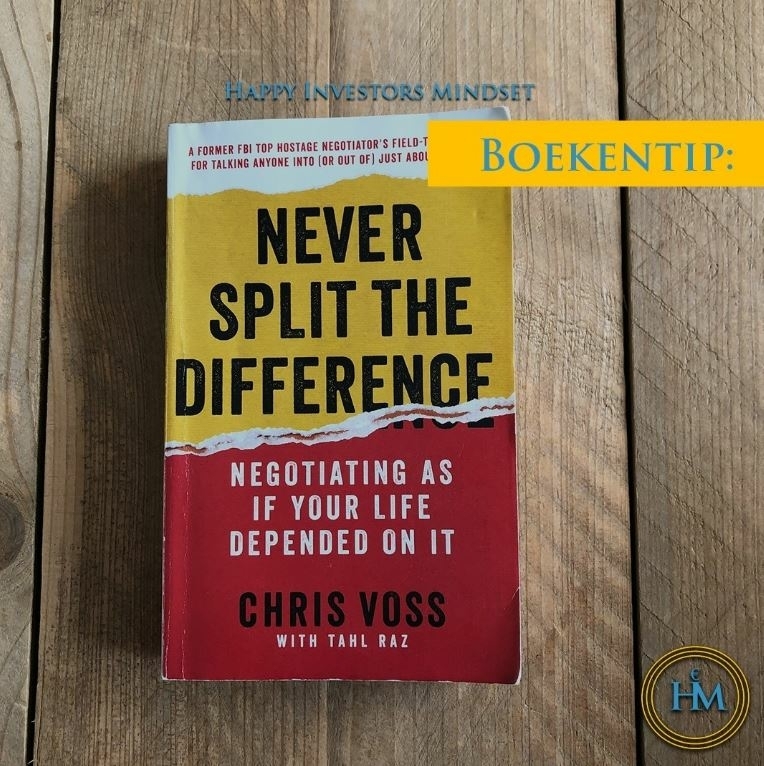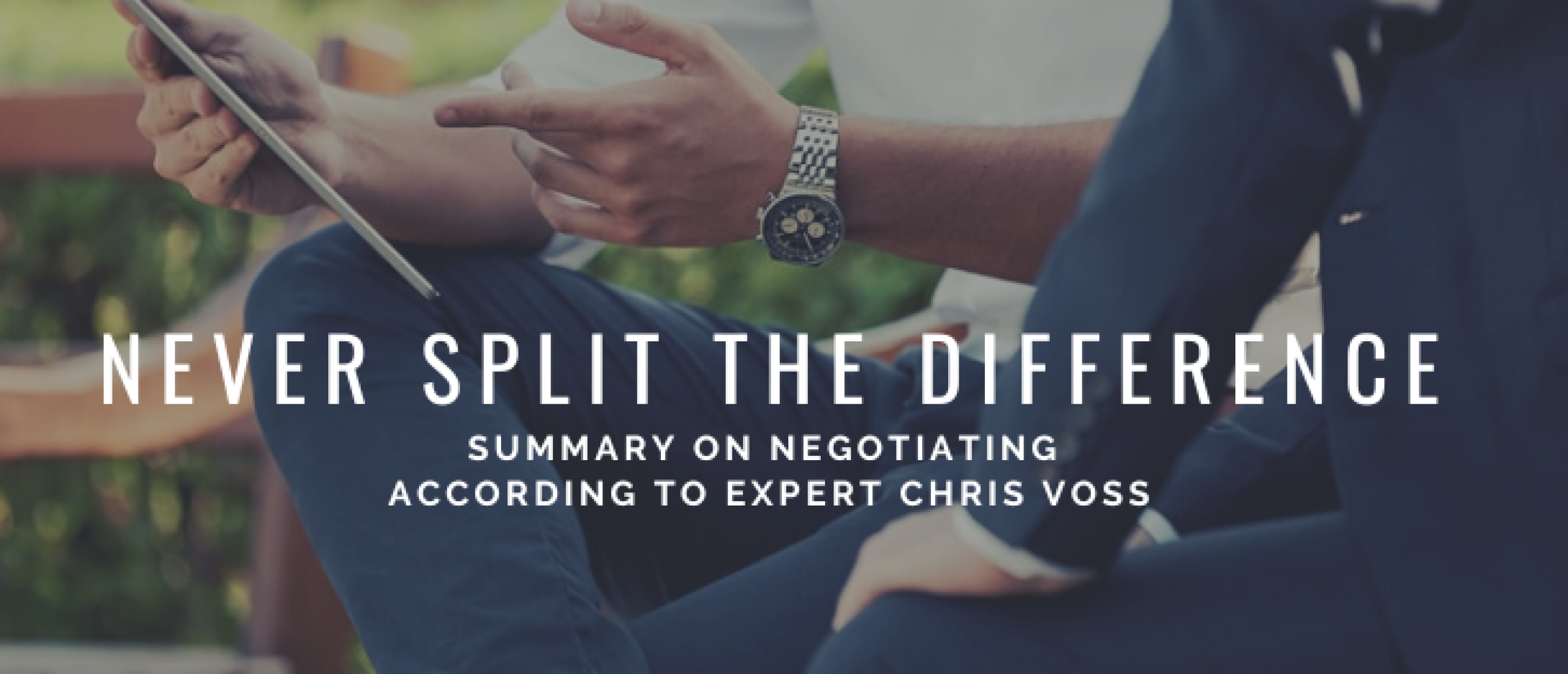Dear Happy Investor, in this article you will read a summary of Never Split the Difference. This is a book by Chris Voss, founder of Black Swan Group and former FBI hostage negotiator with decades of experience.
Chris is a master at convincing people to do just about anything. After years of stressful negotiation situations, he came to the conclusion that learning to negotiate effectively can benefit all facets of life.
In his book, he shares his strategies for effective negotiation. In this summary of Never Split the Difference, you will find the key ideas from this book and how you can apply them in your life.
Essential aspects of Voss' negotiation style

In this summary of Never Split the Difference, we aim to highlight key aspects of his book. This starts with essential aspects of his negotiation style. Practicing and applying these aspects will lead to your ability to negotiate better.
Negotiation is important in life. Negotiating leads to making more money while doing the same work. You simply get more out of supply and demand. You are worth that too. You are selling yourself short if you don't get it.
In addition, negotiating leads to more influence. You get more of what you want. And if you do it right, the other person also gets what she wants. Win-win. Everyone happy. Ultimately, this increases pleasure and happiness.
Mirroring
Mirroring is a fantastic approach to showing emotional intelligence and empathy during a contentious negotiation process and can be tailored to meet any negotiation style. Mirroring is an excellent strategy to use in your personal and professional life. It lets people know that you are paying attention to them and improves your ability to remember what you hear.
Mirroring is an excellent strategy for developing rapport and shared trust with a counterpart during business negotiations or contract negotiations.
Calibrated questions
A calibrated question is a "how" or "what" question that is more focused on evoking an emotional response than expecting information. A well-crafted question can raise sympathy for your cause while giving the other side the appearance of being in charge.
In high-stakes negotiations, the negotiator can use calibrated questions to gain an advantage over their opponents by appealing to their emotions and persuading them to lower their guard. They are an essential part of any successful negotiation.
Chris Voss most favorite question is "how am I supposed to do that?". Think hard about this question. It is a rock-solid pscyhological move in a heated negotiation.
Labeling
Labeling is the verbal process of acknowledging the thoughts and opinions of the other party. Labels are effective deactivators of negative feelings and reinforcers of positive ones. Contrarily, mislabeling is when you purposely misinterpret the other party's position in a negotiation, allowing them the chance to correct you and, in doing so, persuading them to reveal new information.
At the negotiating table, you can alternate between using these two strategies to make your adversaries feel heard and interrogating them to learn any facts they might be hiding.
Tactical empathy
Tactical empathy is the deliberate manipulation of your negotiating counterpart's emotions to gain trust-based influence and close deals. Tactical empathy is influenced by your use of your voice, your body language, labeling, mirroring your counterpart, and dynamic silence.
How to become a better negotiator?
To be a good negotiator, you need to consider some aspects that will help to achieve your goals successfully. Below are important lessons from a summary of Never Split the Difference. This is also a form of personal development! Get more out of every situation:
Humanization
Every negotiation process has a human side. Failing during negotiation does not mean you are not good for it. It just means that there was a mistake during the process. Therefore, it is necessary to keep in mind that a good negotiator is not necessarily the most intelligent and logical.
The human mind is very diverse and complex. So what seems completely rational to some may not be to others. Human behavior is always subject to a share of irrationality and spontaneity.
That is something that you must remember when sitting at the negotiating table: what human nature is like.
Information
Before beginning the negotiation process, it is always necessary to collect all possible information regarding the other parties. The greatest knowledge of it allows you to understand what you want, what you need, and what you are sitting at the negotiating table for.
At this point, it is essential to allow the other person to talk a lot, establishing the best possible relationship. This is how you get trust.
Building rapport consists of the practice of active and continuous listening, getting involved in the talk, and showing interest in what they are saying. Also, you can carry on a conversation by mirroring. This means that at the end of each proposal the other person makes, you repeat what they just said.
In this way, the parties get closer, gaining the necessary trust to start a dialogue. You also give yourself a sense of understanding the other values. It's like putting yourself in their place in certain situations.
Another fundamental point is to understand exactly what the other wants. At this point, it is crucial to ask all the necessary questions and fully understand the other's needs.
Empathy
Understanding emotions is an essential point in any negotiation process. Empathy allows you to understand the situation of others. It is the possibility of putting in someone else's shoes to be clear about the reason for their position. That makes it easier to know precisely what the other wants and why it is so important to them.
Empathy does not mean agreeing with what the other thinks, but rather understanding the situation they are experiencing, despite the differences. It is about integrating into the diversity of thought.
That is a way to gain the parties' trust to move forward in the negotiation.
Dialogue
In any instance of dialogue, the way you speak is of vital importance. The tone of your voice, and firmness, are some of the aspects that everyone perceives. Including yourself, as we learned from Think and Grow Rich and As a Man Thinketh.
How one speaks directly influences the behavior that the rest of the parties will assume during the negotiation process. Therefore, the speed of your speech and intonation are crucial aspects of negotiation.
If you perceive a sense of anguish in the other person, you should remain calm. Then there is the suggestion to accompany the situation with a soft and relaxed voice. That leads to a deeper conversation.
The use of happy and positive tones will arouse more confidence. In any conversation, a smile relaxes the parties and predisposes everyone to dialogue and consensus. It makes it easier to get all the information necessary for a successful agreement.
Rule 7/38/55
This rule arises from the studies carried out by Albert Mehrabian. He states that the messages are based on words only 7% of the time, the voice influences a percentage less than 40%, and body language exceeds 50%. So in communication skills, consider how you transmit messages through body posture and gestures.
Preparation before negotiation
Before starting a negotiation, you should carefully analyze the situation that has led to the need to engage in dialogue as an alternative solution to a conflict. Consider the following questions:
- How can you help to improve the current situation?
- How do you want the present situation to continue after having negotiated? What do you want to achieve from the negotiation?
- Why has an instance of conflict been reached?
- What are the possible solutions to the conflict?
- What is the importance of the conflict for each of the parties?
- What do you want to achieve from the negotiation?
- How should it be negotiated?
What you should not do during negotiation
We listed a series of favorable points for negotiation, but there are also some behaviors that you may avoid to be successful:
- Never ignore emotions. Negotiation doesn't occur between two machines.
- Never try to receive a "yes" from the other party at any price. If you rush to resolve a dispute, chances are you'll end up unhappy with the result.
- In situations of high conflict, discussions, attacks, etc., don't continue. It is convenient to find a pause and walk away looking for calm for a fruitful dialogue.
- Accepting a bad deal or even compromising is always a mistake. This is called splitting the difference, and you should avoid it at all costs.
Good negotiation takes time. With the crucial skills and lessons from this summary of Never Split the Difference, you can get the most out of every negotiation. You'll notice that psychology and just being a "human being" are crucial. But Chris Voss' "calibrated questions" are also ironclad in any negotiation.








